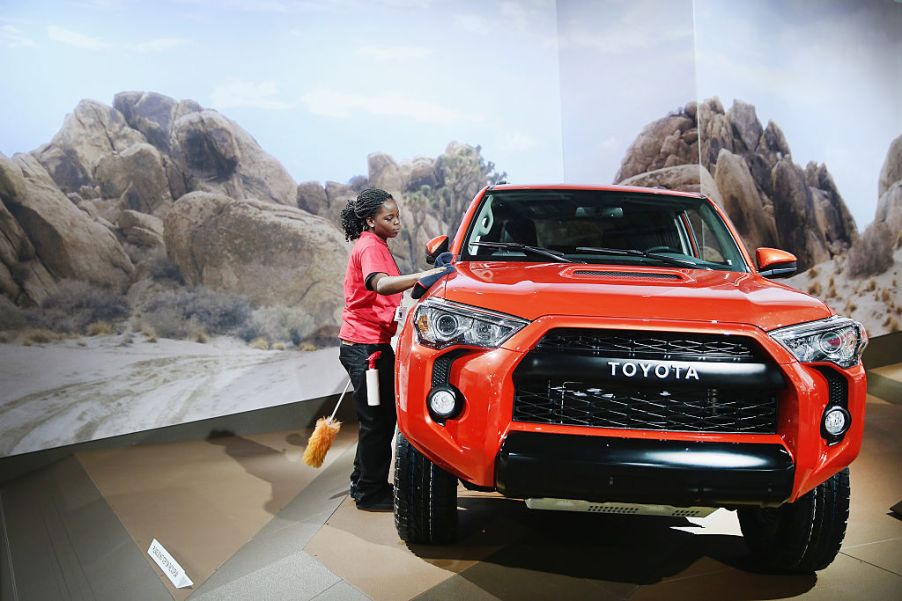
2005-2011 Toyota 4Runner Models Are Dangerous According to This Lawsuit
Automaker Toyota is mostly known for its dependable and reliable cars. Its trucks and SUVs have had a rougher reputation, however, creating a variety of problems for owners over the years. Multiple recalls and lawsuits prove that not all Toyota vehicles are equally reliable. Some Toyota 4Runner owners are even claiming that their vehicles are hazards to drive on the road and that Toyota knowingly sold them like that.
Owners of 2005-2011 Toyota 4Runners are suing over a dangerous problem
Back in December of 2018, a class-action lawsuit was filed in South Carolina against Toyota Motor Corporation that claims owners of certain 4Runners are having some dangerous problems. According to Forbes, a number of owners claim “that the frames on the 2005-11 4Runners are defective and dangerous because they rust prematurely.” Though the lawsuit was filed by Gary Weinreich, a 2005 Toyota 4Runner owner, the plaintiffs that stand behind Weinreich are numerous.
Owners involved in the case claim that their 4Runners aren’t just prone to rust. These claims allege that the frames, made by Dana Holding Corporation, were not designed and made with the proper precautions, and worst of all, Toyota knew it.
According to the lawsuit, owners of 2005-2011 4Runners allege that Toyota “had knowledge and notice of the defect,” claiming that “frames were not properly prepared and treated against rust corrosion when they were manufactured.”
The hazard of Toyota’s negligence
Interestingly enough, this lawsuit follows a separate class-action lawsuit that was settled in 2016 regarding alleged rust defect on certain Tacomas, Tundras, and Sequoias. Even though Toyota still would not admit in any wrongdoing, it awarded $3.4 billion to “resolve allegations of defective rusting undercarriages of various pickups,” according to Top Class Actions. But 4Runner owners claim that Toyota knew this affected 4Runners as well and did nothing to warn them.
According to CarComplaints.com, this lawsuit alleges “corrosion is so excessive occupants are at risk due to weakened frames.” Weinreich himself claims that he bought his Toyota 4Runner brand-new in 2005 but started noticing excessive rust in 2011. By 2018, the rust was so bad that Weinreich’s front control arm broke off and caused him to run off the road. Weinreich also claims that Toyota ignored his concerns and efforts of contact within this time. He and other 4Runner owners claim what they “experience is far beyond typical surface rust and corrosion problems.”
The class-action lawsuit claims that Toyota purposely discluded the 4Runner from the previous lawsuit and allegations due to a lack of complaints at the time. And in place of issuing official recalls for something the company knew was a problem, Toyota practiced subdued inaction by offering service campaigns that not only weren’t publicized, but offered inadequate service to limited customers as well. This rust and corrosion problem can lead to unsafe conditions, in a variety of areas on the 4Runner.
Is Toyota responding to 4Runner owners’ allegations?
Complaints from Weinreich and owners like him reached the National Highway Traffic Safety Administration (NHTSA), prompting an investigation to open. The NHTSA officially opened an investigation into 2002-2006 Toyota 4Runner vehicles on August 17, 2018, after petitioners claimed that excessive rust was “resulting in difficulty controlling the vehicle.” This case does not include all model years involved in the class-action lawsuit and is still currently undergoing investigation.
Toyota still claims its innocence, regardless of the hundreds of thousands of recalls that have been issued regarding rust and corrosion. In response to the Weinreich’s (and others) lawsuit, Toyota asked for a motion of dismissal in May of 2019, arguing “the plaintiff fails to establish any legitimate claims against the automaker,” according to Car Complaints. But the case hasn’t been dismissed, and Toyota may just have another billion-dollar settlement if Weinreich and other 4Runner owners have anything to say about it.


